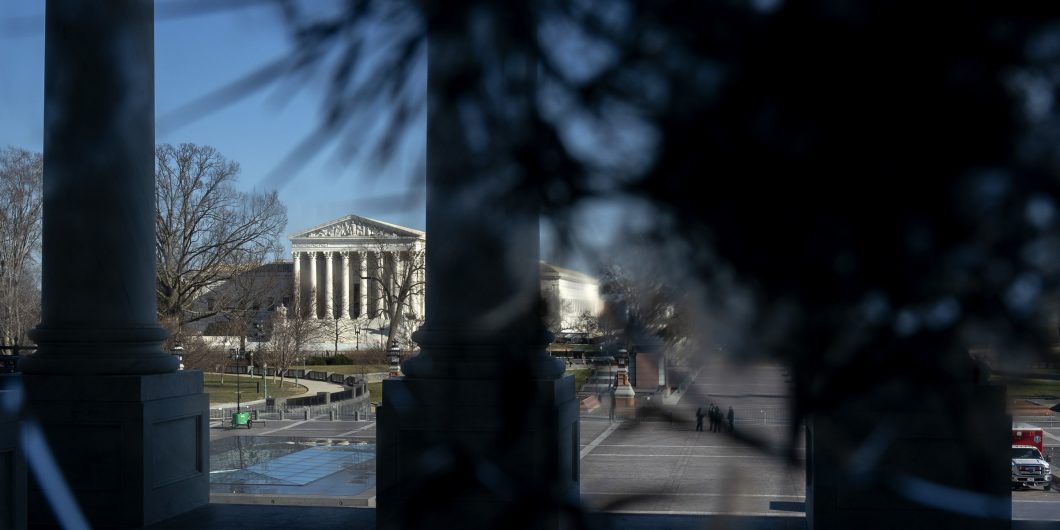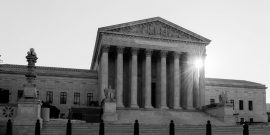In making a constitutional interpretation, the courts must treat previous interpretations as indicators of the law, not the law itself.
Mark Tushnet's Flight 93 Moment
Alarmism, catastrophism, escalationism—call the spirit of brinkmanship that sees existential threats around every corner what you will, it’s no way to run a country. That is true regardless of whether the looming threat is a partisan election or a Supreme Court controlled by ideological opponents. If every moment is so perilous that it demands throwing all norms out the window to save the republic, there is no longer any republic worth saving. Yet that paradox seems to escape feverish elites who claim that the latest crisis demands some self-destructive action.
The right-wing populist version of this is familiar. Sweeping rhetoric about left-wing barbarians at the gates has animated a great deal of rationalized support for candidates who have no business being anywhere near power. “2016 is the Flight 93 election,” wrote Michael Anton in an infamous Claremont Review of Books essay, two months before Donald Trump’s victory shocked the world. “Charge the cockpit or you die. You may die anyway. You—or the leader of your party—may make it into the cockpit and not know how to fly or land the plane. There are no guarantees.” The essay was rightly derided as representing the worst of pro-Trump apologetics. Dressed up in the faux-grandeur of classical philosophy, the essay actually relied on hyperventilation over Trump’s opponent and the state of the republic: Our current moment is akin to 9/11. Take dramatic action, even if it is reckless to the point of foolishness. Any benefits of prudence pale in comparison to the need for decisive action.
Strip away the dramatism and you are left with the oldest trick in the political demagogue’s book: If we don’t escalate the situation now, they, the hated enemy, will escalate first. So throw your little principled concerns about policy, prudence, and wisdom out the window. Know what time it is. Sadly, this kind of reasoning has hardly dissipated in the years since, which is unsurprising because there was really very little about 2016 that made it a crucial moment in American history any more than 2023 is. Some right-wing activists and lawyers would take this mentality into the courtroom, advocating a kind of “Flight 93 jurisprudence,” abandoning originalism’s grounding in the Constitution’s concrete meaning for something more outcome-oriented because the legal conservative movement had failed to achieve its substantive goals. (Originalism’s demise turned out to be greatly overstated; the October 2021 term yielded landmark conservative decisions on abortion, guns, and religion.)
But this paranoid style is limited to neither right-wingers nor fringe academics-turned-Trump-whisperers. Frustrated over the Supreme Court’s latest slate of conservative-constitutionalist decisions, Harvard Law School Professor Mark Tushnet demonstrated that he is Anton’s kindred spirit with his “Open Letter to the Biden Administration on Popular Constitutionalism” (co-authored with political scientist Aaron Belkin). Tushnet and Anton hold opposite views on substantive positions, but share a preference for the worst ideas about how our nation should deal with its inherent problems of ideological division. It’s always Flight 93, all the time—an idea so plainly destructive only an intellectual could advocate it.
The letter begins with a combination of name-calling and civil-war stoking: “We urge President Biden to restrain MAGA justices immediately by announcing that if and when they issue rulings that are based on gravely mistaken interpretations of the Constitution that undermine our most fundamental commitments, the Administration will be guided by its own constitutional interpretations.”
Tushnet, a mainstay of the Critical Legal Theory movement, has long acknowledged that he takes a dim view of that very Constitution and its fundamental commitments—his view of constitutional law is that progressives should not feel bound by the Constitution’s limitation at all. One notorious example is his (prematurely triumphalist) 2016 call to abandon “defensive crouch liberal constitutionalism,” in which he called for significant “doctrine … built from the ground up” through the use of pure progressive reason, while comparing conservatives seeking “’religious liberty’ protections” to “the losers” in the Civil War and “Germany and Japan after 1945.” Nonetheless, he appeals to some vague high constitutional principle to encourage Democrats to demolish one of our most precious norms—that courts without armies will be respected. One can understand that Tushnet may have problems with the current Court’s views on affirmative action, abortion, religious liberty, guns, and any number of other hot-button issues. But it simply beggars belief to think that crashing a precarious feature of our republic’s functioning is a remotely reasonable response.
The more we convince ourselves that our opponents are on the cusp of seizing power forever—or that their run-of-the-mill legal reasoning already reflects that will to power—the closer we get to reducing all our public debates to a game of tug-of-war.
Like Anton, Tushnet claims to speak for regular Americans. He dubs his anti-philosophy “Popular Constitutionalism,” though there is little about its substance—“ignore the courts”—that advances the will of the people. His invocation of the people is particularly galling: the Constitution need not be rewritten nor its fundamental norms altered to achieve the will of the people, at least if there is sufficient consensus. (Surely Tushnet could not with a straight face suggest that presidents ignore the courts on the basis of a bare, fleeting majority.) Legislatures can legislate and even amend the Constitution if the Court rules in favor of some unpopular stance. To skip right past those options towards a national policy of denigrating the Supreme Court in the name of “democracy” (distilled by a President elected by the Electoral College, no less) is simply over the top.
There is a good principled argument for departmentalist constitutional interpretation—that all branches are entitled to interpret the Constitution, and the Supreme Court’s decisions are binding only on the parties at bar—but that is not the argument Tushnet makes. He makes no claims about what the Court’s institutional role would be under such an arrangement, or what respect ought to be afforded to prior Court decisions with which he, and a minority of Americans, agree. Instead, the argument revolves around the exigency of the moment; a national emergency of right-wing constitutionalism: “In this particular historical moment, MAGA justices pose a grave threat to our most fundamental commitments because they rule consistently to undermine democracy and to curtail fundamental rights, and because many of their rulings are based on misleading and untrue claims.”
The mismatch between momentary discontent and the length of time it would take to pick up the pieces should the Biden Administration take this advice should be evident: The Court will not always issue decisions progressives dislike, but rebuilding functional cooperation between branches of the federal government and restoring popular deference to Court decisions may never happen. It is a textbook case of the conservative truism that good things are hard to build and easy to destroy. How great must this emergency be? So great that a Harvard Law professor refers to the conservative majority as “MAGA justices” nine times. Chief Justice Roberts and Justice Thomas would like a word: Does this slur exclude them, or is it just another tactic of a scare campaign wrapped in a temper tantrum?
But Tushnet’s Flight 93 tendencies are most prominent at the end, when he and Belkin ostensibly weigh the costs of a constitutional revolution: “Nor is Popular Constitutionalism in the form of presidential action risk-free, as future GOP administrations would cite it as precedent for ignoring federal courts.” But there’s always an excuse for storming the cockpit—and it’s always the same:
Notably, though, Republican presidents might well ignore federal courts regardless of what President Biden does. The GOP’s failure to hold President Trump accountable for inciting a violent coup is perhaps the clearest of many indications that party leaders and followers are no longer committed to democracy or the rule of law. It is not hard to imagine that a President Trump or DeSantis would circumvent or ignore rulings issued by a liberal Supreme Court.
If we don’t escalate, our opponents will probably do it anyway. (Nevermind that Republican presidents never adopted this strategy despite decades of adverse Court decisions.) We might as well take the first crack.
The attitude of treating forbearance as unilateral disarmament rather than a necessary part of living in pluralistic coexistence with political opponents is itself the problem. Ultimately, it becomes a self-fulfilling prophecy. The more we convince ourselves that our opponents are on the cusp of seizing power forever—or that their run-of-the-mill legal reasoning already reflects that will to power—the closer we get to reducing all our public debates to a game of tug-of-war. Persuasion and prudence mean nothing when you are convinced your opponents have hijacked the plane. The only thing that matters is taking back control. In response, your enemies inevitably embrace Flight 93 jurisprudence of their own, and the court spirals, faster and faster, into a place where fairness and justice are secondary concerns because it is primarily a political theater. What use is maintaining a republic in name only?
Such coarse reasoning is painful to hear from regular Americans who feel they cannot trust their fellow citizens. It is what you might expect to hear from a partisan apologist who has no good arguments for his preferred candidate, and so has resorted to appealing to our basest impulses. From prominent scholars and teachers at our finest educational institutions, it is downright embarrassing—for Tushnet, for Harvard, and for a nation whose “best and brightest” are now mere purveyors of rank partisan catastrophizing.



